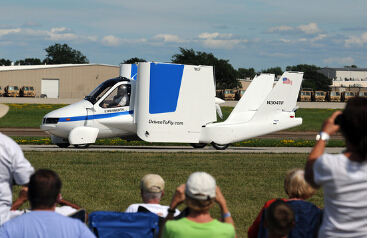Traffic jams in China are so frequent and tedious that drivers and passengers alike have devised creative ways to alleviate the boredom.
中國(guó)的堵車(chē)發(fā)生得如此頻繁和持久,以至于司機(jī)和乘客都想出了富有創(chuàng)意的方法來(lái)消磨無(wú)聊時(shí)間。
That's one reason why Terrafugia Chief Executive Carl Dietrich thinks he can find both customers and investors there. Mr. Dietrich and his colleagues make flying cars, which he believes can ease some of China's woes.
這正是Terrafugia首席執(zhí)行長(zhǎng)迪特里希(Carl Dietrich)認(rèn)為他在中國(guó)既能找到消費(fèi)者又找能到投資者的原因之一。迪特里希和他的同事生產(chǎn)會(huì)飛的汽車(chē),他相信該產(chǎn)品可以在一定程度上緩解中國(guó)的堵車(chē)問(wèn)題。

'China is experiencing a lot of the pains of becoming an industrialized nation,' he said, citing traffic congestion and air pollution as examples. 'There is a clear need' for flying cars in China. Mr. Dietrich says he has made two visits to China in the past four months to sound out possible investors.
他說(shuō),中國(guó)正經(jīng)歷著成為一個(gè)工業(yè)化國(guó)家的諸多痛苦,比如交通擁堵和空氣污染等。他表示,中國(guó)“顯然需要”會(huì)飛的車(chē)。迪特里希稱(chēng),他在過(guò)去四個(gè)月來(lái)兩次到訪(fǎng)中國(guó),尋覓可能的投資者。
Terrafugia needs some wind beneath its improbable wings. The company is aiming for a 2015 release in the U.S. for its first model, the Transition.
Terrafugia需要借助一些東風(fēng)才能展翅飛翔。該公司力爭(zhēng)于2015年在美國(guó)發(fā)布其首款車(chē)型。
Then there's its twin-rotor TF-X model, which still in development. The four-seat, plug-in hybrid electric flying car will have vertical takeoff and landing capabilities, according to the company's website. It will be a 'real draw' in China, said Mr. Dietrich.
Transition,之后還將推出雙旋翼車(chē)型TF-X,后者還在研發(fā)中。根據(jù)該公司網(wǎng)站的介紹,這款四座、插電混合動(dòng)力飛車(chē)將擁有垂直起降能力。迪特里希說(shuō),該車(chē)型在中國(guó)將大受歡迎。
Terrafugia's concepts have their skeptics, of course. But even if it surmounts those considerable obstacles, the company will still face unique challenges in China.
當(dāng)然,Terrafugia的理念也遭到了一些質(zhì)疑。但是即便其克服了這些大障礙,該公司在中國(guó)仍將面臨獨(dú)特的挑戰(zhàn)。
While reaction from Chinese to his flying machines has been positive, he said, there was pessimism among the people he met with about how the Chinese government would react to such new technologies.
迪特里希稱(chēng),雖然中國(guó)人對(duì)于其飛行汽車(chē)的反應(yīng)是正面的,但是他會(huì)見(jiàn)的一些人對(duì)于中國(guó)政府對(duì)待這類(lèi)新科技的態(tài)度還是持悲觀的看法。
A key stumbling block is private access to aviation space in China, over which authorities here hold a tight grip.
一個(gè)關(guān)鍵的障礙是中國(guó)對(duì)私人放開(kāi)飛行空域的程度,有關(guān)部門(mén)目前對(duì)此控制得非常緊。
Mr. Dietrich said the growth prospects for flying cars in China will depend on how quickly Beijing opens up air traffic to private users. 'It will happen, but the question in how quickly.'
迪特里希表示,“飛車(chē)”在中國(guó)的增長(zhǎng)前景將取決于政府向私人用戶(hù)開(kāi)放空域的速度有多快。他說(shuō),會(huì)開(kāi)放的,問(wèn)題是能有多快。
While China Real Time is intrigued by the idea of jumping over gridlock, we also wonder at the wisdom of flying cars in a place where the ones on the road already present a host of problems. Mr. Dietrich said TF-X models will be computer controlled so the driver wouldn't be able to operate the vehicle in a dangerous manner.
雖然中國(guó)實(shí)時(shí)報(bào)欄目被飛過(guò)擁堵區(qū)的想法迷住了,但是本欄目也想知道,在一個(gè)道路交通參與者已經(jīng)制造了大量問(wèn)題的地方,引入會(huì)飛的汽車(chē)是個(gè)好主意么?迪特里希稱(chēng),TF-X車(chē)型將由電腦控制,所以司機(jī)無(wú)法以危險(xiǎn)的方式駕駛汽車(chē)。












